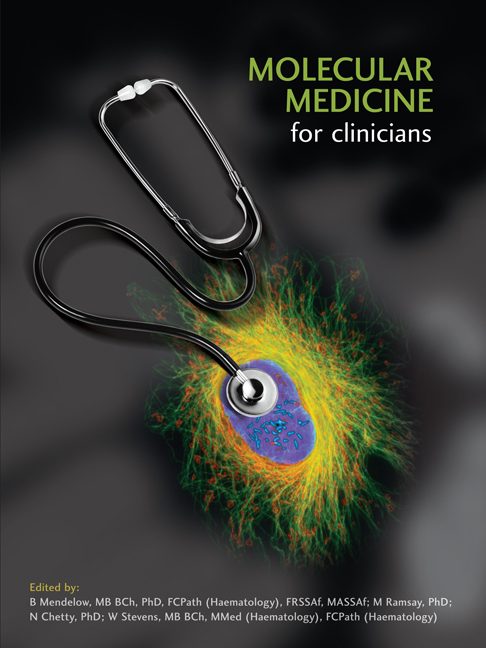Book contents
- Frontmatter
- Contents
- Foreword
- Acknowledgements
- Chapter 1 Introduction
- Keynote Essay 1: Defining Who We Are: DNA in Forensics, Genealogy and Human Origins
- Section 1 Principles Of Cellular And Molecular Biology
- SECTION 2 MOLECULAR PATHOLOGY
- Chapter 8 Genomes and the Environment: An Overview of Molecular Pathology
- Chapter 9 Genetics, Genomics, Health and Disease: General Considerations
- Chapter 10 Chromosome Disorders
- Chapter 11 Mendelian Inheritance
- Chapter 12 Unusual Molecular Processes that Impact on Disease
- Chapter 13 Population Genetics
- Chapter 14 Complex Multifactorial Inheritance
- Chapter 15 Molecular Basis for Phenotypic Variation
- Chapter 16 Medical Genetics
- Keynote Essay 3: Human Cloning: Should We Go There?
- Chapter 17 Neoplasia: General Considerations
- Chapter 18 Oncogenes
- Chapter 19 Mammalian DNA Repair
- Chapter 20 Tumour Suppressor Genes and Inherited Susceptibility to Cancer
- Chapter 21 Carcinoma
- Chapter 22 Leukaemias and Lymphomas
- Chapter 23 Molecular Approaches to the Diagnosis, Prognostication and Monitoring of Cancer
- Keynote Essay 4: Microbes, Molecules, Maladies and Man
- Chapter 24 Molecular Basis of Infectious Diseases: General Considerations
- Chapter 25 Immunology
- Chapter 26 Human Immunodeficiency Virus
- Chapter 27 Tuberculosis
- Chapter 28 Malaria
- Chapter 29 Influenza
- Chapter 30 Oncogenic Viruses
- Chapter 31 Vaccines and Immunisation
- Keynote Essay 5: Drugs and the 21st Century
- SECTION 3 MOLECULAR THERAPEUTICS
- SECTION 4 RESEARCH AND THE CONTINUING EVOLUTION OF MOLECULAR MEDICINE
- Glossary
- Contributors’ Biographies
- Source Material And Recommended Reading
- Permissions And Credits
- Index
Chapter 21 - Carcinoma
from SECTION 2 - MOLECULAR PATHOLOGY
Published online by Cambridge University Press: 04 June 2019
- Frontmatter
- Contents
- Foreword
- Acknowledgements
- Chapter 1 Introduction
- Keynote Essay 1: Defining Who We Are: DNA in Forensics, Genealogy and Human Origins
- Section 1 Principles Of Cellular And Molecular Biology
- SECTION 2 MOLECULAR PATHOLOGY
- Chapter 8 Genomes and the Environment: An Overview of Molecular Pathology
- Chapter 9 Genetics, Genomics, Health and Disease: General Considerations
- Chapter 10 Chromosome Disorders
- Chapter 11 Mendelian Inheritance
- Chapter 12 Unusual Molecular Processes that Impact on Disease
- Chapter 13 Population Genetics
- Chapter 14 Complex Multifactorial Inheritance
- Chapter 15 Molecular Basis for Phenotypic Variation
- Chapter 16 Medical Genetics
- Keynote Essay 3: Human Cloning: Should We Go There?
- Chapter 17 Neoplasia: General Considerations
- Chapter 18 Oncogenes
- Chapter 19 Mammalian DNA Repair
- Chapter 20 Tumour Suppressor Genes and Inherited Susceptibility to Cancer
- Chapter 21 Carcinoma
- Chapter 22 Leukaemias and Lymphomas
- Chapter 23 Molecular Approaches to the Diagnosis, Prognostication and Monitoring of Cancer
- Keynote Essay 4: Microbes, Molecules, Maladies and Man
- Chapter 24 Molecular Basis of Infectious Diseases: General Considerations
- Chapter 25 Immunology
- Chapter 26 Human Immunodeficiency Virus
- Chapter 27 Tuberculosis
- Chapter 28 Malaria
- Chapter 29 Influenza
- Chapter 30 Oncogenic Viruses
- Chapter 31 Vaccines and Immunisation
- Keynote Essay 5: Drugs and the 21st Century
- SECTION 3 MOLECULAR THERAPEUTICS
- SECTION 4 RESEARCH AND THE CONTINUING EVOLUTION OF MOLECULAR MEDICINE
- Glossary
- Contributors’ Biographies
- Source Material And Recommended Reading
- Permissions And Credits
- Index
Summary
INTRODUCTION
Carcinoma is defined as a malignant tumour of epithelial tissue. A variety of types are recognised, reflecting the tissue of origin. Broadly, malignant tumours of squamous epithelial origin, or squamous carcinomas, are differentiated from the tumours of glandular epithelia – the adenocarcinomas. Carcinomas constitute the most prevalent human malignancy, accounting for approximately 85% of tumours worldwide.
AETIOLOGY AND PATHOGENESIS
Certain crucial concepts have long been identified that, in part, serve to explain the pathogenetic mechanisms of this group of tumours. Firstly, carcinomas are a phenomenon associated with ageing. They are uncommon before 50 years, but thereafter increase exponentially with increasing age. Furthermore, there are often distinct geographical trends associated with carcinomas of different organ systems. It was therefore postulated early on that the aetiology of carcinoma has its origin in the environment. This is now largely established. General aspects of the pathogenesis of carcinomas have been covered in Chapter 17. There are a number of additional factors of special relevance to carcinomas. These include:
• Chemicals
• Dietary factors
• Physical agents
• Infectious organisms.
Many chemicals are now identified as causing malignant disease. Probably the best example is the relationship between cigarette smoking and bronchogenic carcinoma, one of the commonest visceral malignancies worldwide. Early epidemiological studies identified a strong association between most carcinomas of the lung and chronic tobacco usage. At a histological level, the simple columnar epithelium that lines most of the respiratory tract is subjected to constant irritation by smoke inhalation and responds by changing its phenotype to that of a mature squamous epithelium, a process known as metaplasia. Thereafter a percentage of these metaplastic epithelia undergo further cytological changes with increasing abnormality in numbers, shape, size and orientation of the epithelial layer, the process of dysplasia, considered a pre-neoplastic lesion. Once a highgrade dysplasia, sometimes loosely termed carcinoma in situ, is identified, this abnormal tissue may invade across the basement membrane of the epithelium, thus progressing to invasive carcinoma.
- Type
- Chapter
- Information
- Molecular Medicine for Clinicians , pp. 249 - 260Publisher: Wits University PressPrint publication year: 2008



